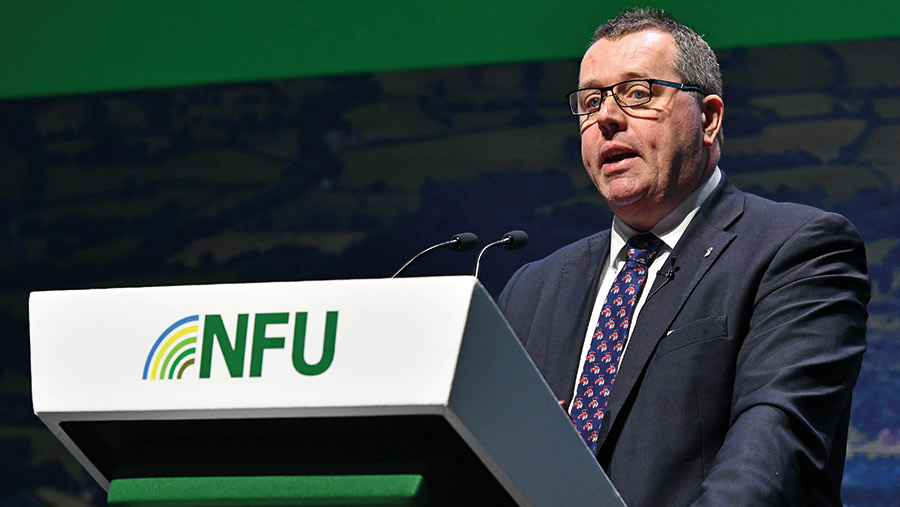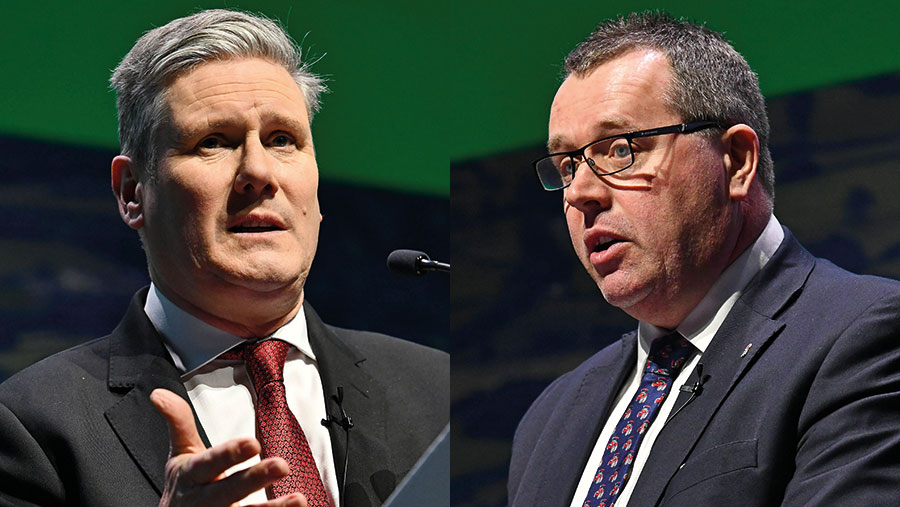NFU Conference 2023: ‘No join-up’ on food security across government
 Mark Spencer © NFU
Mark Spencer © NFU NFU deputy president Tom Bradshaw has warned there is “no join-up at all” across government on food security, as pictures of empty shelves once again flood social media.
Mr Bradshaw was speaking to Farmers Weekly at the union’s annual conference in Birmingham this week, following a private meeting where Defra farming minister Mark Spencer made clear farmers and growers are unlikely to receive energy support after the current scheme closes on 31 March.
He said the NFU would continue to lobby for the sector to be included on the Energy and Trade Intensive Industries list, which provides a discount from 1 April, but that Mr Spencer was “not optimistic” this could be achieved.
See also: Retailers blamed as supermarket shelves empty again
Asked how this matched with the government’s promise to prioritise food security, Mr Bradshaw said: “There is no join-up at all. The trouble is the Department for Business, Energy and Industrial Strategy [now the Department for Energy Security and Net Zero] runs the energy intervention scheme, whereas food security is Defra’s priority, questionably.
“Maybe a land use strategy or a food strategy will help, but somewhere there does need to be this prioritisation of food production. The words are there, but not the actions.”
Labour Party leader Sir Keir Starmer, meanwhile, made a clear pitch to farming voters during his speech to the conference, focusing strongly on food security.
“The former director-general of MI5, Baroness Eliza Manningham-Buller, has said food supply, in her words, is part of our national security. She is right,” he said. “Food security is national security.”
When pressed by Farmers Weekly on whether this high ranking of food security under a Labour government would mean an increase in the farming budget – which currently stands at £2.4bn a year, compared to the £45bn annual defence budget – Sir Keir refused to be drawn, saying he would not make any funding commitments.
Defra secretary Therese Coffey, who also addressed the conference on Wednesday (22 February), reiterated the government’s commitment to hold a food security summit chaired by the prime minister later this year.
But she appeared to row back on a suggestion by Mr Spencer at a recent Environment, Food and Rural Affairs select committee hearing that Defra would consider carrying out an annual food security report.
At the moment, ministers must produce a report once every three years. Ms Coffey said she wanted to make sure Defra resources were focused on outcomes, when asked whether they could be completed more frequently.
The first report, published in December 2021, did not reference the threat posed to food security by the Ukraine war, despite the fact that Russia had amassed 110,000 troops near the border in spring that year.
Starmer v Spencer: Pledges compared

© NFU
Keir Starmer
- Guarantee to “locally and sustainably” source 50% of all food purchased by the public sector
- Seek a new veterinary agreement with the EU for agri-products for the whole of the UK, easing trade friction
- Take a “practical, pragmatic” approach to immigration to allow the food industry to source labour
- Put 13,000 more police into rural towns and villages
- “Hardwire” production standards into trade agreements
- Work with farming industry to shape key policies around bovine TB and the right to roam
Mark Spencer
- Meet retailers regularly to “encourage them to recognise” farmers are carrying the heaviest burden of increased costs
- “Wrap-up” review of dairy and pork supply chains and assessing where action is needed in other sectors
- Commitment that growers will not pay premium over national living wage for seasonal workers from 1 April 2023
- Publish the government response to the Rock Review “very soon”
- Reinvest all money saved from Basic Payment Scheme cuts into new schemes and grants
- Introduce funding for small abattoirs later in the year
